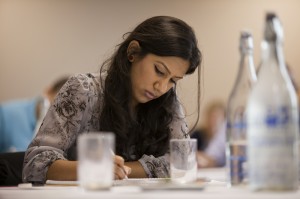We offer a range of flexible short workshops which mostly run as after school twilight sessions.
Our workshops update teachers’ own knowledge and build confidence in teaching this complex and emotive subject. All our teacher training is free, thanks to funding from the Department for Education and Pears Foundation. You will leave with access to a wealth of effective and engaging classroom resources.
Authentic Encounters
- How can we move young people without shocking or traumatising them?
- How can we capture students’ interest in the Holocaust?
In this workshop, through the interrogation of an authentic artefact, teachers first encounter Leon Greenman, an Englishman, living in the Netherlands, who was deported to Auschwitz-Birkenau with his wife and child. Leon’s story provides a clear thread throughout our programme.
This one hour workshop can be run as a Twilight, INSET or short session at a time to suit your school.
Unlocking antisemitism
Our research shows that young people are often mystified by the targeting of Jews for mass murder – this activity shows how teachers can work with the film Roots of antisemitism to uncover the origins of this ‘longest hatred’, and to explore continuity and change from medieval anti-Judaism to modern antisemitism. It provides essential knowledge and understanding to counter common myths and stereotypes of the Jewish people.
Find out more about the teaching resources you will be able to access after attending one of our ‘Unlocking antisemitism’ workshops.
Frozen moments
When we hold a photograph in our hands it can feel as though we are looking directly on the past. A slice of time, a ‘frozen moment’ continues in the present. In this workshop we consider photos from two extraordinary albums:
one documenting the arrival and selection for murder of Hungarian Jews at Auschwitz-Birkenau, the other a series of photos of the perpetrators of this crime at rest and play.
Two ‘Auschwitz albums’ –
but what do they really reveal about the Holocaust?
Pursuit of Justice
How is it possible to punish crimes of genocide?
What does it mean to seek justice for crimes of such magnitude?
This session presents four lessons for KS3 following the story of a single family, their murder at Sobibor and the trial almost 70 years later of former guard John Demjanjuk, accused of abetting the murder of some 27,900 people in 1943.
Exploring issues of legal and moral justice, this powerful series of lessons and educational materials are especially relevant for teachers of citizenship and history interested in the legacy and continuing significance of the Holocaust.
Find out more about the teaching resources you will be able to access after attending one of our ‘Pursuit of Justice’ workshops:
- What happened to Helene Seligmann and her family?
- What is justice?
- What is needed for justice?
- Justice achieved?
Whose Anne Frank? Representations of a young girl
The diary of Anne Frank is often used as a ‘way in’ to studying the Holocaust. Anne is also an iconic figure in popular culture; interpreted and reinterpreted, in a range of media from plays, films and TV through to Japanese cartoon books.
This workshop, specifically for English teachers, uses Critical Discourse Analysis to explore several of these representations and to highlight the tensions that exist between the popular ideas about Anne Frank and what she actually wrote. This reveals a more nuanced and profound writer who still has the power to shock some people.
British Responses to the Holocaust

Our 2015 research highlights a significant lack of student knowledge and understanding surrounding British responses to the unfolding genocide. The most popular thinking amongst students surveyed, for example, was that the Holocaust was the trigger for Britain’s entry into the Second World War. This session models lesson ideas and resources based on archival material to engage students and help them construct a better understanding of events and the issues involved.
The core session has a historical focus, encouraging students to construct an understanding of Britain’s role as events unfolded. A key element of this is hands-on use of archival evidence to give voice to the responses of a range of groups within Britain; The National Archives, The Weiner Library, Mass Observation, the Ben Uri Gallery, the Churchill Archives Centre, and the Imperial War Museum all provide evidence of how different groups responded in different ways at different times. Around the core session there are also optional approaches developed for History, around the historical skills involved in looking at archival evidence, for Citizenship around issues of realms of responsibility, and for approaches in assessing student understanding.
“British Responses to the Holocaust” is a modular set of lessons and resources. The core part is a 2-hour session delivered through a History framework. There is also a 1-hour connected Citizenship lesson, and a 1-hour additional History lesson looking at the practice of looking at archival sources, that can be booked in additional to the core lesson, or as stand-alone sessions.


